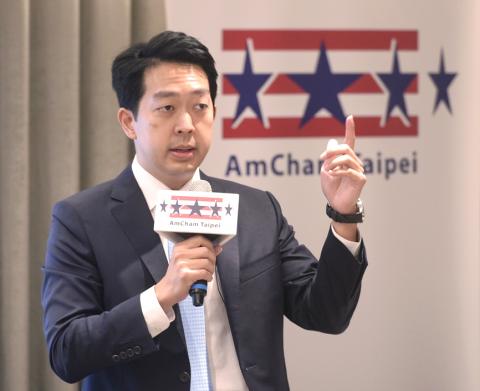Most US companies operating in Taiwan are optimistic about the nation’s economy and their profit outlooks this year, but voiced grave concerns about energy sufficiency and strict labor rules, a survey released yesterday by the American Chamber of Commerce in Taipei (AmCham) found.
The annual poll of 198 member companies showed that 81 percent are optimistic about revenue growth this year, up from 56.1 percent last year, while 79 percent are upbeat about their three-year outlook.
“The views in this survey are important, because they come from business leaders with broad international experience and valuable expertise in sectors crucial to Taiwan’s continued success,” AmCham chairman Albert Chang (章錦華) told a news conference.

Photo: Chang Chia-ming, Taipei Times
The trade group of 1,000 members from more than 500 companies plans to create an industry council with the government to help increase foreign investment in Taiwan.
This year, it is to help attract 10 multinational corporations to make Taiwan their operation base in Asia, Chang said, adding that AmCham is working on the details and might provide more details at its annual Hsieh Nien Fan (謝年飯) banquet on March 21.
Ranking US diplomatic officials are also to join the event intended by the trade group to thank Taiwanese government officials for their cooperation with the foreign business community, he said.
US firms have expressed a keen interest in the Internet of Things (IoT), biotechnology and energy businesses, encouraged by the government’s efforts to shore up the “5+2” innovative industries, Chang said.
“Executives feel a sense of urgency for innovation as the world grows more competitive. We hope to begin discussing concrete ways soon,” he said.
However, the chamber raised doubts over the feasibility of Taiwan’s aim to become nuclear free by 2025.
Power supply sufficiency, voltage stability and electricity costs are all vital concerns, with 84.46 percent of respondents worried whether electricity supply can meet demand, the survey found.
AmCham is to push for further revisions to the Labor Standards Act (勞動基準法), as its members feel that current regulations are not flexible enough to meet the needs of a knowledge-based economy, said Seraphim Ma (馬靜如), a senior partner at global law firm Baker McKenzie.
“We welcome the recent revisions, but an overwhelming majority of respondents support further revisions to exempt professional and managerial talent from the rigidities of existing regulations,” Ma said.
About half of the respondents said that labor issues are likely to be a key factor in their decisions on future business expansion in Taiwan.
Member companies were also critical of US President Donald Trump’s decision to withdraw from the Trans-Pacific Partnership, saying Washington’s foreign policy and trade-related initiatives have put them at a competitive disadvantage in the Asia-Pacific region.

Taiwan’s long-term economic competitiveness will hinge not only on national champions like Taiwan Semiconductor Manufacturing Co. (TSMC, 台積電) but also on the widespread adoption of artificial intelligence (AI) and other emerging technologies, a US-based scholar has said. At a lecture in Taipei on Tuesday, Jeffrey Ding, assistant professor of political science at the George Washington University and author of "Technology and the Rise of Great Powers," argued that historical experience shows that general-purpose technologies (GPTs) — such as electricity, computers and now AI — shape long-term economic advantages through their diffusion across the broader economy. "What really matters is not who pioneers

In a high-security Shenzhen laboratory, Chinese scientists have built what Washington has spent years trying to prevent: a prototype of a machine capable of producing the cutting-edge semiconductor chips that power artificial intelligence (AI), smartphones and weapons central to Western military dominance, Reuters has learned. Completed early this year and undergoing testing, the prototype fills nearly an entire factory floor. It was built by a team of former engineers from Dutch semiconductor giant ASML who reverse-engineered the company’s extreme ultraviolet lithography (EUV) machines, according to two people with knowledge of the project. EUV machines sit at the heart of a technological Cold

TAIWAN VALUE CHAIN: Foxtron is to fully own Luxgen following the transaction and it plans to launch a new electric model, the Foxtron Bria, in Taiwan next year Yulon Motor Co (裕隆汽車) yesterday said that its board of directors approved the disposal of its electric vehicle (EV) unit, Luxgen Motor Co (納智捷汽車), to Foxtron Vehicle Technologies Co (鴻華先進) for NT$787.6 million (US$24.98 million). Foxtron, a half-half joint venture between Yulon affiliate Hua-Chuang Automobile Information Technical Center Co (華創車電) and Hon Hai Precision Industry Co (鴻海精密), expects to wrap up the deal in the first quarter of next year. Foxtron would fully own Luxgen following the transaction, including five car distributing companies, outlets and all employees. The deal is subject to the approval of the Fair Trade Commission, Foxtron said. “Foxtron will be

INFLATION CONSIDERATION: The BOJ governor said that it would ‘keep making appropriate decisions’ and would adjust depending on the economy and prices The Bank of Japan (BOJ) yesterday raised its benchmark interest rate to the highest in 30 years and said more increases are in the pipeline if conditions allow, in a sign of growing conviction that it can attain the stable inflation target it has pursued for more than a decade. Bank of Japan Governor Kazuo Ueda’s policy board increased the rate by 0.2 percentage points to 0.75 percent, in a unanimous decision, the bank said in a statement. The central bank cited the rising likelihood of its economic outlook being realized. The rate change was expected by all 50 economists surveyed by Bloomberg. The